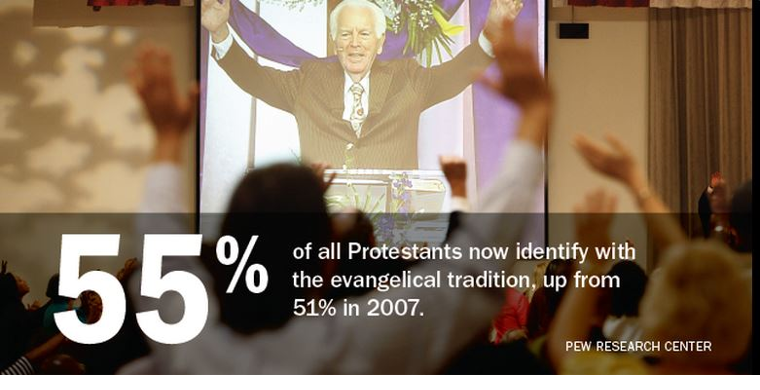Fewer Catholics & Protestants, More Evangelicals
By Mike McManus
May 14, 2015
The Washington Post headline on Wednesday was, "Christianity Shrinking Across America." The percent of Americans who describe themselves as Christians dropped eight points from 78% to 70% between 2007 and 2014, reports the Pew Research Center.
Alan Cooperman, who directed the Pew study said, "It's remarkably widespread. The country is becoming less religious as a whole, and it's happening across the board."
Not quite. True, the percentage identifying themselves as Catholics dropped 3% and Mainline Protestants fell 3.4%. But Evangelical Protestants grew by 2 million in those years, up from 59.8 million in 2007 to 62.2 million while Mainline Protestants lost 5 million. "As a result, evangelicals now constitute a clear majority (55%) of all U.S. Protestants," Pew reported.
What has grown the most are the religiously unaffiliated, who shot up from 16.1% to 22.8%. The number of religiously unaffiliated adults increased by 19 million since 2007. There are now 56 million atheists, agnostics and those with no religious affiliation in America. They are more numerous than Catholics or Mainline Protestants.
A high percentage of them are millennials born since 1980, who find traditional services boring. However, mainline churches have also turned off many older orthodox believers by endorsing same-sex marriage.
The Episcopal Church had 1.9 million members in 2010, but only 670,000 attending on a typical Sunday. Their average age was 64 and most churches had under 70 attending.
Since 2007 more than 100,000 Episcopalians left the denomination over its support of same-sex marriage, which they considered unbiblical, and formed the Anglican Church of North America, which is strongly evangelical and growing.
Similarly, 341,000 left the liberal Presbyterian Church (U.S.A.) which marries gays to create the conservative Presbyterian Church in America and another 89,000 left to create the Evangelical Presbyterian Church.
Pew found that there are more than four former Christians for every convert to Christianity. Half of the unaffiliated were raised as Protestants and a third were Catholic.
(Muslims doubled from .4% to .9%. The percentage identifying themselves as Jewish rose slightly from 1.7% to 1.9%.)
Pew also asked 35,000 people if they consider themselves evangelicals, and 35% did so. In fact, half of self-identified Christians regard themselves to be "born-again" or evangelical in 2014 -- up from 44 percent who did so in 2007.
Pew reports that the number of Mainline Protestant adults fell from 41 million in 2007, to 36 million in 2014.
Many more of those leaving Mainline Churches start attending non-denominational churches, of which there are tens of thousands. They tend to have contemporary music and innovative presentations of the Gospel such as drama that appeals to millennials.
What Pew may be identifying is that "mostly non-practicing Mainline Protestants and Catholics are increasingly" calling themselves unaffiliated, says Mark Tooley, President of the Institute for Religion and Democracy. "Most of this group still professes belief in God, many pray and some attend church. But they no longer claim ties to a specific tradition. Less than a third, about 7%, are atheist or agnostic."
However, shrinking numbers of Catholics are having a shocking impact.
A third of the Catholic churches in the Archdiocese of New York - 112 parishes will close or merge with a nearby church this year. Since 1996, a fifth of Catholic churches have closed, even though the number of Catholics grew from 61 million to 68 million confirmed members in 2010 according to church statistics.
However, Pew identified only 51 million Catholic adults in 2014, 3 million fewer than in its 2007 survey.
Catholics have the problem of a plunging numbers of priests, who fell from 57,900 in 2008 to only 40,200 in 2012. That is partly due to sexual scandals involving priests, but the larger reason is that fewer than 500 men are ordained as priests annually, and many more die or retire at age 75.
Perhaps it is time for Catholics to consider ordaining married men, which would attract thousands. In fact, there are 17,800 permanent deacons, most of whom are married, who perform many priestly tasks - baptizing, distributing Communion, presiding at funerals and even preaching. Most would become priests if they could, and thousands more would be attracted to a married priesthood. Many closed churches could reopen.
Evangelicals are planting many new churches -- dozens in Washington D.C. alone, according to Tooley. It is their presentation of the orthodox faith that attracts people who want to commit their lives to serving others.
The bad news about fewer Catholics and Mainline Protestants are at least partly offset by growing Evangelicals.
Michael J. McManus is President of Marriage Savers and a syndicated columnist














